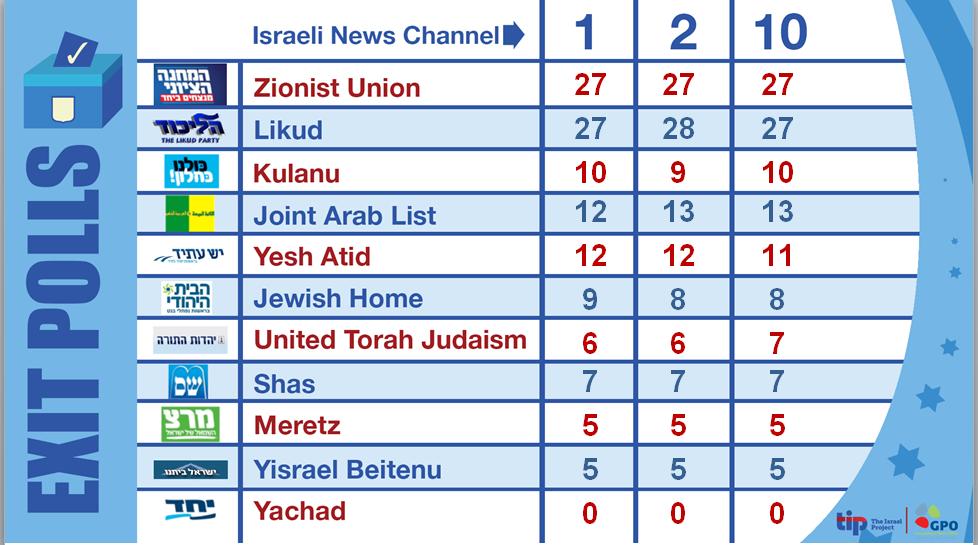Polls
have closed in Israel
Israel
election: No clear winner, exit polls suggest
Neither
Israel's governing Likud party nor the opposition Zionist Union has a
clear lead in the general election, exit polls suggest
BBC,
17
March, 2015, 20:10 GMT
Exit
polls by two Israeli broadcasters gave both sides 27 seats each in
Israel's 120-seat parliament.
Both
sides would need support from other parties in order to form a
coalition government.
More
than 65% of those eligible voted in the election, which ended at
22:00 local time (20:00 GMT).

d.

Exit
polls show Netanyahu’s Likud tied with Zionist Union in Israel
elections
Arab
Alliance takes third place in Israeli elections – exit polls
RT,
17
March, 2015
The
national election in Israel has finished with no clear lead for any
party, exit polls showed on Tuesday evening. Israel’s governing
Netanyahu-led Likud party and the opposition Zionist Union have seen
even results, the national TV channels reported.
Channel
10 and Channel 1 said the two opposing parties secured 27 seats each
in the 120-member parliament – the Knesset. Channel 2 said that PM
Benjamin Netanyahu's Likud finished with a narrow victory, winning 28
seats to the 27 of Isaac Herzog’s Zionist Union.
The
Joint Arab List, led by Ayman Odeh, which has emerged as one of the
surprises in the election campaign, took the third place in the vote,
according to exit polls.
3 TV networks release their exit polls in Israel's election. Voters rally around center-left & center-right pillars
The
Tuesday election proved to be a test for Israel's long-serving PM
Benjamin Netanyahu, with the vote having been predicted to be a
closely-fought battle. While Netanyahu stayed true to his hardline
policies, having once again announced on Monday that he would not
allow the creation of a Palestinian state, the Zionist Union
concentrated their election campaign on social and economic issues.
The
results were claimed to be a “great victory” by Netanyahu. On his
Twitter account, the PM said that “against all odds” the election
became “a great victory for the national camp led by Likud, a great
victory for the people of Israel.”
Voter
turnout in the election has surpassed 2013 attendance levels, with
almost 66 percent of 5.9 million eligible voters declared to have
attended two hours before the polls closed.
Israel's
Prime Minister Benjamin Netanyahu casts his ballot for the
parliamentary election as his son Yair stands behind him at a polling
station in Jerusalem March 17, 2015. (Reuters/Sebastian
Scheiner)Israel's Prime Minister Benjamin Netanyahu casts his ballot
for the parliamentary election as his son Yair stands behind him at a
polling station in Jerusalem March 17, 2015. (Reuters/Sebastian
Scheiner)
Turnout
among Arab Israelis, who account for just over 20 percent of the
population, was reported to have been higher than in the past. They
were seen to have formed long lines outside polling stations on
Tuesday, with the leader of the Arab Joint List Ayman Odeh describing
the current vote as “a historic day for the Arabs.”
With
final results not expected until early Wednesday morning, the lineup
of Israel’s new government will not be completely clear for some
weeks, but its formation has already proved to be a challenge for
both winning candidates.
Israelis
vote for party lists, not individual candidates, with the Knesset
seats allocated according to the percentage of the votes which the
parties win. The country is thus governed by a coalition, with the
head of the winning party having up to six weeks to form it.
That has not stopped Netanyahu from declaring victory, according to this tweet from TASS
That has not stopped Netanyahu from declaring victory, according to this tweet from TASS
Нетаньяху заявил о победе на парламентских выборах в Израиле
http://tass.ru/mezhdunarodnaya-panorama/1835877 …









No comments:
Post a Comment
Note: only a member of this blog may post a comment.